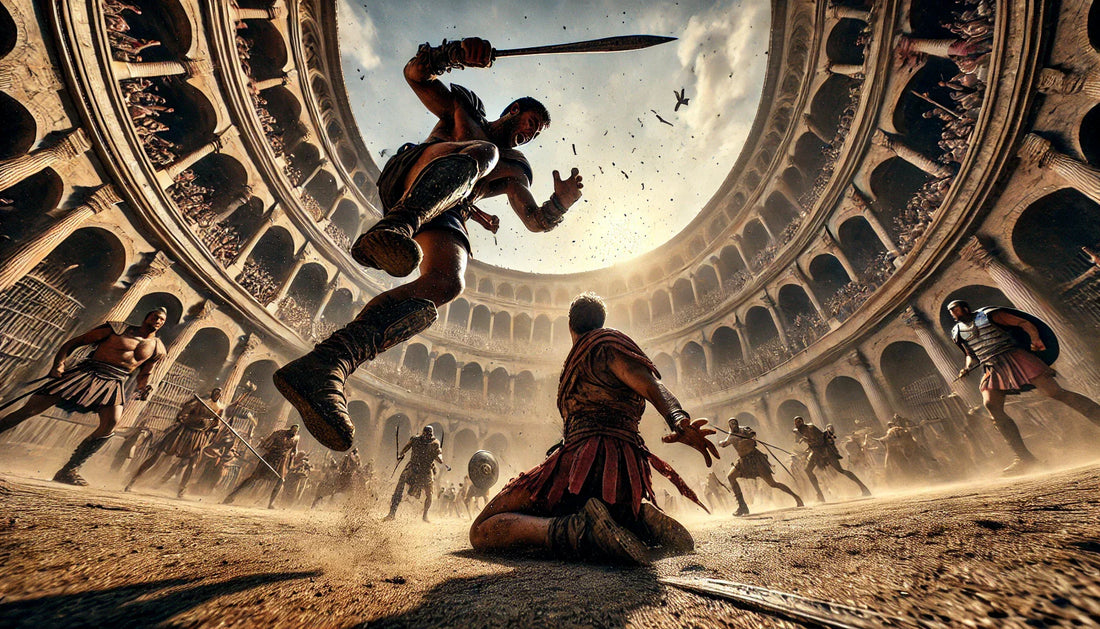
The Origins of the Duel
Share
By Coach Jus
The first fighters weren’t sportsmen. They were warriors, executioners, and living offerings to the gods. Before the ring, before the ropes, before the rules, combat was sacred violence—a bridge between the mortal and the divine. Blood was currency, and in the Greco-Roman world, combat was a ritual just as much as it was a spectacle.
The first recorded Roman gladiatorial combat took place at the funeral games of Brutus Pera in 264 BCE, where three pairs of gladiators fought to honor the dead. This marked the beginning of the Roman munera, combat spectacles originally tied to funerary rites. Over time, these contests evolved into mass entertainment, with men fighting not for religious duty but for survival, wealth, or freedom. By 216 BCE, at the munus of Marcus Aemilius Lepidus, 22 pairs of gladiators battled, demonstrating how 1-on-1 combat had become embedded in Roman culture.

Gladiators fought in some of the most legendary matchups, like the duel between Priscus and Verus in 80 CE, where both men fought so valiantly that they were granted a rare double victory in the Colosseum. But Rome was not the first to embrace 1-on-1 combat as a test of strength and fate. Earlier traditions in Greece, Mesopotamia, and Egypt had already cemented the idea that a fight between two warriors could decide more than just the outcome of a match—it could dictate destiny.
In Mesopotamian mythology, Gilgamesh and Enkidu battled in a legendary duel before forging their unbreakable brotherhood, reinforcing the idea that single combat was a way to test strength, resolve, and honor. The Egyptian myth of Horus and Set’s battle for the throne established a precedent where combat was more than a contest—it was a trial by ordeal, a way to determine divine right and leadership.

Greek warriors engaged in their own forms of ritualized combat. The Iliad tells of Paris and Menelaus dueling to settle the Trojan War, while Achilles and Hector's final battle embodied the tragic, honor-bound nature of single combat. The Etruscans, precursors to the Romans, practiced ritual duels in funerary rites as early as the 6th century BCE, as depicted in tomb paintings. These influences fed directly into the Roman gladiatorial tradition.
Outside the Mediterranean, single combat took many forms. Wu Zixu’s duel against Zhi Ying in 6th-century BCE China, the mace duel of Bhima and Duryodhana in the Mahabharata, and samurai duels like Musashi vs. Sasaki Kojiro in 1612 CE all illustrate how cultures across the world embraced the notion of a man proving himself through 1-on-1 battle. Even in Southeast Asia, warriors like Lapu-Lapu engaged in duels that shaped history, famously killing Magellan in 1521.

So what was it really about? Survival? Spectacle? Ritual? Were men called to fight, or were they forced into it by circumstance? The answer may be all of the above. Whether it was a Roman slave fighting for freedom, a Greek hero dueling for honor, or a warrior defending his land, the fight has always been more than just violence—it was meaning, purpose, and fate intertwined.
Though the weapons have changed, the essence remains. Fighters today may step into a cage instead of an arena, they may fight under referees instead of emperors, but the struggle remains the same. The echoes of the past live on in every punch thrown, every battle fought. The first fighters bled for gods, kings, and survival. Today, fighters bleed for their own reasons. But is the call really any different?

#coachjus #handsdownchinup #lumabanboxing #boxing #blog #boxingblog
